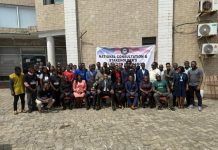Africa-Press – Liberia. In recent times, our weekly contribution to this Paper has gravitated toward the field of Artificial Intelligence or AI. This is not only because AI is the trending technology, but it is an effort to create awareness and appreciation for this game-changing technology that is impacting the world.
Even though Liberia is traditionally NOT an early adopter of new technologies, we are convinced that creating awareness and subsequently engaging in activities that can prepare Liberia to engage in the RESPONSIBLE USE(S) of AI now or sooner, is necessary. The activities to which I refer include, educating or upskilling Liberians about AI, developing AI policies and strategies, and hopefully developing AI systems.
Thanks to the U.S State Department which selected us last year to be a part of the AI-Connect Global Team, we continue to build our AI “knowledge repository”. As a member of the AI-Connect team, we have the opportunity to garner insights from other countries’ experiences, thus informing our approach to evangelize AI in Liberia.
As part of our efforts to “evangelize” AI in Liberia, we leverage our access to one of Liberia’s popularly read dailies, to provide insight on AI with contextual relevance to Liberia. In today’s article we will discuss the potential impact of AI on Liberia. But first, let’s provide a definition of AI for those who have not been following.
Using a definition culled from a Price waters house Coopers paper, “AI is a collective term for computer systems that can sense their environment, think, learn, and take action in response to what they’re sensing and their objectives.” Other writings found in the extant literature provide various definitions of AI.
Yet, I’ve always defined it succinctly as the ability of computers or computer systems to mimic human intelligence. This is ostensibly a broad way of defining AI, but it is more succinct and a “quick to remember” definition of the term; of course, that’s my opinion.
Forms of AI in use today include, among others, digital assistants, chatbots and machine learning. Many of you who use Facebook might have noticed or at some point, used its facial recognition abilities and features.
Those who use Alexa, and other AI-supported systems can attest to some of the benefits of AI. Now, we know that many of you use AI without knowing that you are using it!!!! But clearly, AI has already permeated the Liberian society and its transformational benefits are gradually being experienced.
In a 28-page analysis of the real value of AI, and how businesses can capitalize on it, PricewaterhouseCoopers or PwC reported that AI is a major game changer that has the potential to contribute $15.7 trillion1 to the global economy in 2030. This, according to the paper, is more than the current output of China and India combined. “Of this, $6.6 trillion is likely to come from increased productivity and $9.1 trillion is likely to come from consumption side effects”, the report suggests. So, how does Liberia benefit from all this talk about AI and the trillions it is expected to contribute to the global economy?
AI, like the internet, has the potential to bring major transformational possibilities and significant benefits to Liberia by improving healthcare, education, agriculture, and other key areas. For example, in the Education sector where Liberia continues to struggle, AI-powered educational tools could help to address the shortage of teachers and resources. AI-based language learning apps will be used to help students improve their language skills, and AI-powered tutoring systems could provide personalized learning experiences. (AI in Education).
AI in Healthcare: In the healthcare sector, the possibilities and benefits are many. With advancements made in computer vision and imaging processing, Deep Learning, Machine Learning, predicative analysis, etc., the health sector could benefit from a myriad of AI-powered diagnostic tools and medical imaging technologies. These AI-powered tools will help doctors in Liberia to identify diseases and conditions more accurately and quickly. This could lead to better health outcomes for patients, especially in rural areas where access to healthcare is limited.
AI in Agriculture: The Agriculture sector is a vital sector in Liberia and many African countries. With AI, we can improve our Agriculture sector using AI-powered precision farming technologies and tools. These tools will help decision-makers and farmers in Liberia to improve their crop yields and reduce waste. This could help to address food insecurity and increase farmers’ incomes.
AI in ICT/Telecom: AI can improve the Information and Communications Technology (ICT) sector in several ways. For example, through AI, there will be a lot of automation of routine tasks and processes, such as data entry and analysis, freeing up human workers to focus on higher-level tasks. This can increase efficiency and productivity in the ICT sector. Through Predictive Maintenance, AI will monitor the performance of IT and Telecommunications systems and equipment, and predict when maintenance is needed, reducing downtime and saving money on repairs. AI can use Data Analytics to analyze large amounts of data and identify patterns and insights that can be used to make better business decisions. This will help the ICT sector to improve products and services, optimize operations, and identify new business opportunities.
AI in Cybersecurity: In the area of Cybersecurity, AI has can help prevent cyber-attacks by analyzing data for unusual activity and patterns, which will help to protect sensitive data and prevent downtime. Predictive analysis can also allow cybersecurity experts to develop preventive mechanisms to avoid cyber-attacks. AI systems can also help detect and prevent fraud. AI systems can do this through analysis of data to identify patterns of fraudulent behavior, such as unauthorized use of a customer’s account or stolen identities. This will reduce the risk of fraud and protect customer data significantly.
AI in Government and Business: AI can help the Government and the Business sector improve services to customers. The Government’s eGovernment program can benefit from AI-powered chatbots to provide customer service and support, reducing the workload on human customer service representatives. AI systems can also analyze customer data to identify patterns and provide personalized recommendations that will inform government policies and strategy. The business and other sectors will also gain similar benefits from AI just as the Government.
Indeed, AI can improve and positively impact the economy and the future of Liberia. But there are other challenges that accompany AI that we must not ignore. With AI, there’s a possibility that there will be a lot of job losses especially in areas that involve manual labor, customer service, etc. Unless we find a solution sooner, this could exponentiate the already numerous problems the Liberian economy faces.
Another concern is that the benefits of AI may not reach everyone in Liberia. Access to technology and the necessary infrastructure are still limited in many areas. This could create a “digital divide” between those who have access to AI and those who do not.
Overall, the impact of AI on the economy and future of Liberia is likely to be complex and multifaceted. While there are many potential benefits, policymakers must also consider the potential risks and work to ensure that the benefits of AI are shared fairly and equitably. Additionally, investments in education and infrastructure will be critical to ensure that Liberians are equipped with the skills and resources needed to fully participate in the AI-driven economy.
AI’s advent and integration in the Liberian society are inevitable just as the Internet was. Despite the existing culture in which there’s a clash between tradition and modernity, AI will integrate in the Liberian setting and will “quantum leap” a lot of our economic activities. Instead of ignoring it now, we should embrace it and its possibilities and put in place mechanisms required to tackle the challenges that may come with it.
Source: Liberianobserver.
For More News And Analysis About Liberia Follow Africa-Press






